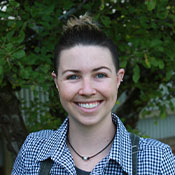Elizabeth Flatt, DVM

Elizabeth Flatt, DVM
Graduation Date: 2020
USA/New Zealand
VetSouth, Gore, New Zealand
Small Animal Veterinary Medicine
What’s it like to work as a veterinarian serving rural farmland communities in New Zealand? Just ask Elizabeth Flatt, BSc, DVM ’20, who grew up in Georgia and is now an associate veterinarian at VetSouth in Gore, New Zealand.
St. George’s University: Why did you choose to move to New Zealand?
Dr. Flatt: I asked Google! I remember being in my clinical year at Mississippi State University, sitting at a local coffee shop, trying to decide what I was going to do next. Veterinary medicine is so versatile, and as a new grad you are especially malleable. So, I focused on location and extracurricular activities. I wanted to live abroad—specifically somewhere where I could kitesurf and snowboard within a two-hour drive. Google said New Zealand.
It was great timing! I arrived pre-COVID, and this has been the place to be. Thanks, Google!
SGU: What types of animals do you treat there?
Dr. Flatt: VetSouth is a mixed-animal practice that is a part of the VetNZ Ltd., where the philosophy is all about looking after our team, providing premium animal welfare, and making rural communities better by giving back to the regions that support us. This also means that many of our veterinarians are shareholders, ensuring the focus stays local, and our animals, clients, and people are prioritized. I have been with this company for 18 months now and they remain true to their philosophy.
The large animal work is primarily cattle, sheep, horses, and even deer. We also treat pigs and camelids on occasion.
The small animal work is primarily working dogs. Huntaways and heading dogs seem to be Kiwi farmers’ breeds of choice. They are New Zealand-originated breeds. They are especially needed in hill country where not even four-wheelers or horses can easily maneuver. That said, in the last decade, pets such as dogs, cats, exotics, and chickens have increasingly made a presence here—sadly, no snakes as there are none in New Zealand.
SGU: As an associate veterinarian, what are some of the key responsibilities that you have?
Dr. Flatt: In Gore, there are four strictly “smallie” vets, with me as the only full-time small animal veterinarian. The closest specialist referral center is nearly seven hours away in Christchurch. So, oftentimes, you and your team are the only option. Fortunately, we have a wide variety of diagnostic and surgical capabilities. We have CR and DR x-rays, ultrasound, scopes, in-house blood machines, etc.
My main areas of specialty include ultrasound procedures, reproductive assistance, soft tissue surgery, and internal and emergency medicine. I have been receiving referrals from surrounding clinics to perform various ultrasound and ultrasound-guided procedures. Also, I do a significant amount of artificial insemination around the Southland and Otago regions to help with breeding.
SGU: Best day so far at the clinic?
Dr. Flatt: It was around 7:30pm when the emergency text came through: “Cat stuck in grill.” A cat got struck by a vehicle and became lodged in the grill of the car. There was a penetrating chest wound that had to get surgically closed. It was merely a puncture from the outside. From the inside, however, the whole intercostal space was shredded top to bottom. I had to wire the adjacent ribs together and place a chest drain. The best part is that the surgery was a success and the cat lives on. The coolest part is that I felt a beating heart.
SGU: What excites you about practicing veterinary medicine?
Dr. Flatt: The absolute best is being able to fix a patient and get them back home and into action. The second-best part is providing those unfixable patients with a quality of life for their remaining time. This, ultimately, makes you an integral part of their family and business. I love being able to serve people in such ways.
SGU: What is an issue in the field of veterinary medicine that is important to you?
Dr. Flatt: Improving work-life balance. Being an American, I work until I burn out. New Zealanders are huge on work-life balance. We have built-in “tea breaks” twice a day and a one-hour lunch break. Sure, we may not always get those breaks, but this is a priority implemented by VetSouth and our managers. I admire this and wish more of the international veterinary industry prioritized this.
SGU: Three key qualities to be a good veterinarian?
Dr. Flatt: Critical thinking, people skills, and adaptability.
SGU: What are your plans for the future?
Dr. Flatt: In the immediate future: I am here until at least July 2023. Over the long term, I would love to open my own specialty veterinary clinic and further my seedstock operation.
SGU: How did SGU prepare you for a career as a veterinarian?
Dr. Flatt: SGU provided me with a solid foundation of veterinary medicine. It is impossible to teach a student everything about veterinary medicine. Every case is unique. Veterinarians must rely on their foundation to develop a plan on how to best approach each case.
SGU: Best piece of advice for SVM students?
Dr. Flatt: Take time to enjoy the present. As a student we often get so fixated on what’s to come that we neglect to appreciate what’s around us now.